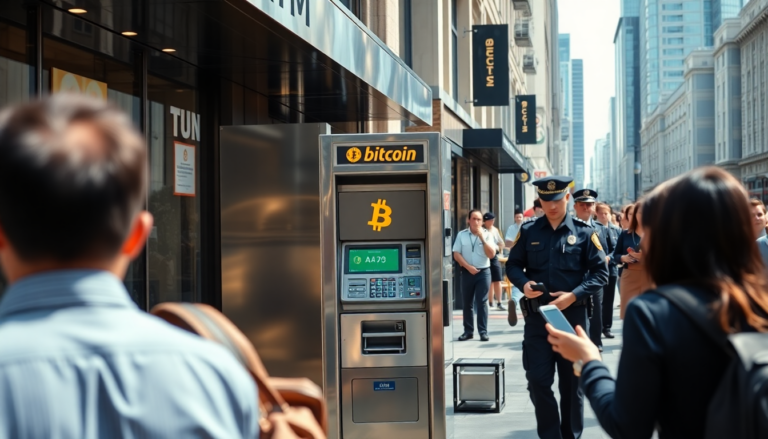Argomenti trattati
The rise of cryptocurrency has created a fascinating yet challenging landscape for both law enforcement and Bitcoin ATM operators. As these machines pop up in more locations, there have been increasing reports of police misunderstandings and overreach regarding cryptocurrency transactions. This article explores the intricate relationship between Bitcoin Depot, a leading Bitcoin ATM operator, and law enforcement agencies, shedding light on recent events and the broader legal context surrounding cryptocurrency. What does this mean for the future of Bitcoin ATMs and their operators?
Bitcoin ATMs: A Growing Concern for Law Enforcement
Bitcoin ATMs work much like traditional ATMs, allowing users to deposit cash and receive cryptocurrency in return. But they also introduce unique challenges for law enforcement. Chris Ryan, the Chief Legal Officer of Bitcoin Depot, has expressed concerns about police using excessive force to access their machines to seize cash. He argues that this approach often oversteps legal boundaries. Why is it crucial for law enforcement to grasp the ownership of funds in these machines? The funds belong to the operator, not the individuals who may have been scammed.
Take, for instance, a recent incident in Jasper County where a sheriff forcibly opened a Bitcoin Depot ATM after a resident reported losing $25,000 to a scammer. Although the sheriff secured a search warrant, the legal status of the funds in the ATM remained murky. Ryan pointed out that authorities should focus on tracing the cryptocurrency back to its wallet address instead of damaging third-party property. This situation highlights a significant disconnect between law enforcement practices and the realities of cryptocurrency transactions. How can we bridge this gap?
Legal Implications and Responsibilities
The actions of law enforcement carry considerable consequences for Bitcoin ATM operators. When machines are damaged during police interventions, operators face hefty financial losses. Bitcoin Depot estimates that each machine costs around $14,000, and damage from police raids not only disrupts their operations but also raises pressing questions about accountability. Ryan has indicated that Bitcoin Depot may charge jurisdictions for damages incurred during such incidents—something that could strain budget-conscious law enforcement agencies.
Additionally, understanding the legal responsibilities tied to Bitcoin ATMs is crucial. Users need to confirm they are depositing funds into their own wallets, yet many remain unaware of the risks linked to third-party addresses. When scams occur, the recovery process should ideally mirror traditional banking practices, where authorities collaborate with financial institutions to freeze accounts and recover lost funds. Unfortunately, the lack of cryptocurrency knowledge among law enforcement and the judiciary often leads to misguided actions that can worsen the plight of victims. What steps can be taken to improve this situation?
The Future of Bitcoin ATMs and Law Enforcement Relations
As the cryptocurrency landscape continues to evolve, law enforcement needs to adapt its approach. The increasing presence of Bitcoin ATMs offers both opportunities and challenges. While these machines provide valuable services, they can also be exploited by scammers taking advantage of their rapid transaction capabilities. Ryan notes that scammers are finding ways to use Bitcoin ATMs, creating a complicated dynamic that necessitates a deeper understanding of the technology and its implications.
Looking ahead, it’s essential for law enforcement agencies to invest in training and education concerning cryptocurrency and how these machines operate. By enhancing their understanding of these technologies, law enforcement can better navigate the challenges they present and avoid infringing on the rights of legitimate operators. Establishing clearer guidelines and protocols for engaging with Bitcoin ATMs will not only protect operators but also strengthen the overall integrity of the cryptocurrency ecosystem. Isn’t it time we ensure that law enforcement and Bitcoin operators can coexist and thrive?
In conclusion, the relationship between Bitcoin ATM operators and law enforcement is fraught with challenges that require thoughtful consideration and proactive dialogue. As this sector grows, addressing these issues will be vital for ensuring both consumer protection and the lawful operation of cryptocurrency services. How can we foster better collaboration moving forward?

